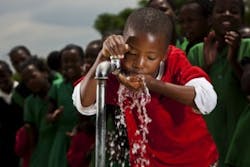| As part of its first wave of new investments, WADA will support integrated approaches to clean water and sanitation service delivery in Africa where more than 300 million are without an improved water source and 630 million lack improved sanitation facilities. (Photo: Business Wire) |
Highlights of the work to be supported include a range of approaches that offer lasting clean water and sanitation services in partnership with communities and utilities to support government objectives, including:
Nigeria -- At least 65,000 people will benefit from the installation of hand-pump boreholes, improved sanitation facilities, hand-washing stations and rain harvesters at schools and healthcare facilities. Communities will also be trained in the long-term maintenance of the infrastructure and water management committees will be offered capacity building services.
Zambia -- The project will provide sanitation facilities and hygiene education in schools in peri-urban Lusaka, benefiting up to 50,000 school children. The project includes resource mobilization strategies to support the long-term operations and maintenance of the schools' water, sanitation and hygiene programs. It is also expected that this project will provide sustainable clean water access to up to 44,000 people through community water kiosks and a distribution network.
Ghana -- More than 35,000 people will benefit from the construction of clean water kiosks and sanitation services to include the provision of total sanitation marketing campaigns.
“This important public-private partnership builds on our Agency's new and first-ever Water and Development Strategy to improve health and food security across the world. Its programs represent the next generation of this vital alliance -- helping families lift themselves out of poverty and communities onto a path towards sustainable development," said Dr. Rajiv Shah, USAID Administrator.
"Water stewardship is a key priority for our business and we are committed to returning the water we use in our beverages and their production back to communities," said Muhtar Kent, Chairman and CEO, the Coca-Cola Company. "We are pleased to launch the next phase of impact with one of our longest standing and most valued partners, USAID. Expanding our work together will help bring safe water to thousands of people in communities we serve and continue to bring us closer to meeting our replenishment goal."
About the Water and Development Alliance (WADA)
The Water and Development Alliance (WADA) is a collaboration between the Coca-Cola system (including corporate, foundations, and bottling partners) and USAID to promote improved water management and expand clean water access to help build sustainable communities in the developing world. The Alliance is managed by the Global Environment & Technology Foundation. Based on the results of a detailed program evaluation, in 2013 USAID and The Coca-Cola Company laid out the strategy for the next phase of the Alliance’s activities, which will focus on three pillars: Water for Health, improving operating environments and implementing at scale models for the sustainable delivery of WASH services; Water for Environment, addressing local watershed risks to improve resiliency and future access to ecosystem services; and Water for Productive Use, promoting the efficient use of water for economic growth and sustainable value chains and food security goals. With a combined investment of over $31 million since 2005, WADA is having a positive impact on the lives of people and the health of ecosystems in 25 countries in Africa, Asia, the Middle East, and Latin America, with plans for expansion in future years.
About the United States Agency for International Development (USAID)
The United States Agency for International Development (USAID) is an independent federal government agency that receives overall foreign policy guidance from the Secretary of State. Our work supports long-term and equitable economic growth and advances U.S. foreign policy objectives by supporting economic growth, agriculture and trade, global health, democracy, conflict prevention and humanitarian assistance. USAID provides assistance in five regions of the world: Sub-Saharan Africa, Asia, Latin America and the Caribbean, Europe and Eurasia, and the Middle East. With headquarters in Washington, D.C., USAID's strength is its field offices around the world. We work in close partnership with private voluntary organizations, indigenous organizations, universities, American businesses, international agencies, other governments, and other U.S. Government agencies. USAID has working relationships with more than 3,500 American companies and over 300 U.S.-based private voluntary organizations.
About the Coca-Cola Company
The Coca-Cola Company (NYSE: KO) is the world's largest beverage company, refreshing consumers with more than 500 sparkling and still brands. Led by Coca-Cola, the world's most valuable brand, our Company's portfolio features 16 billion-dollar brands including Diet Coke, Fanta, Sprite, Coca-Cola Zero, vitaminwater, Powerade, Minute Maid, Simply, Georgia and Del Valle. Globally, we are the No. 1 provider of sparkling beverages, ready-to-drink coffees, and juices and juice drinks. Through the world's largest beverage distribution system, consumers in more than 200 countries enjoy our beverages at a rate of more than 1.8 billion servings a day. With an enduring commitment to building sustainable communities, our Company is focused on initiatives that reduce our environmental footprint, support active, healthy living, create a safe, inclusive work environment for our associates, and enhance the economic development of the communities where we operate. Together with our bottling partners, we rank among the world's top 10 private employers with more than 700,000 system associates. For more information, visit Coca-Cola Journey at www.coca-colacompany.com, follow us on Twitter at twitter.com/CocaColaCo or visit our blog, Coca-Cola Unbottled, at www.coca-colablog.com.
###



